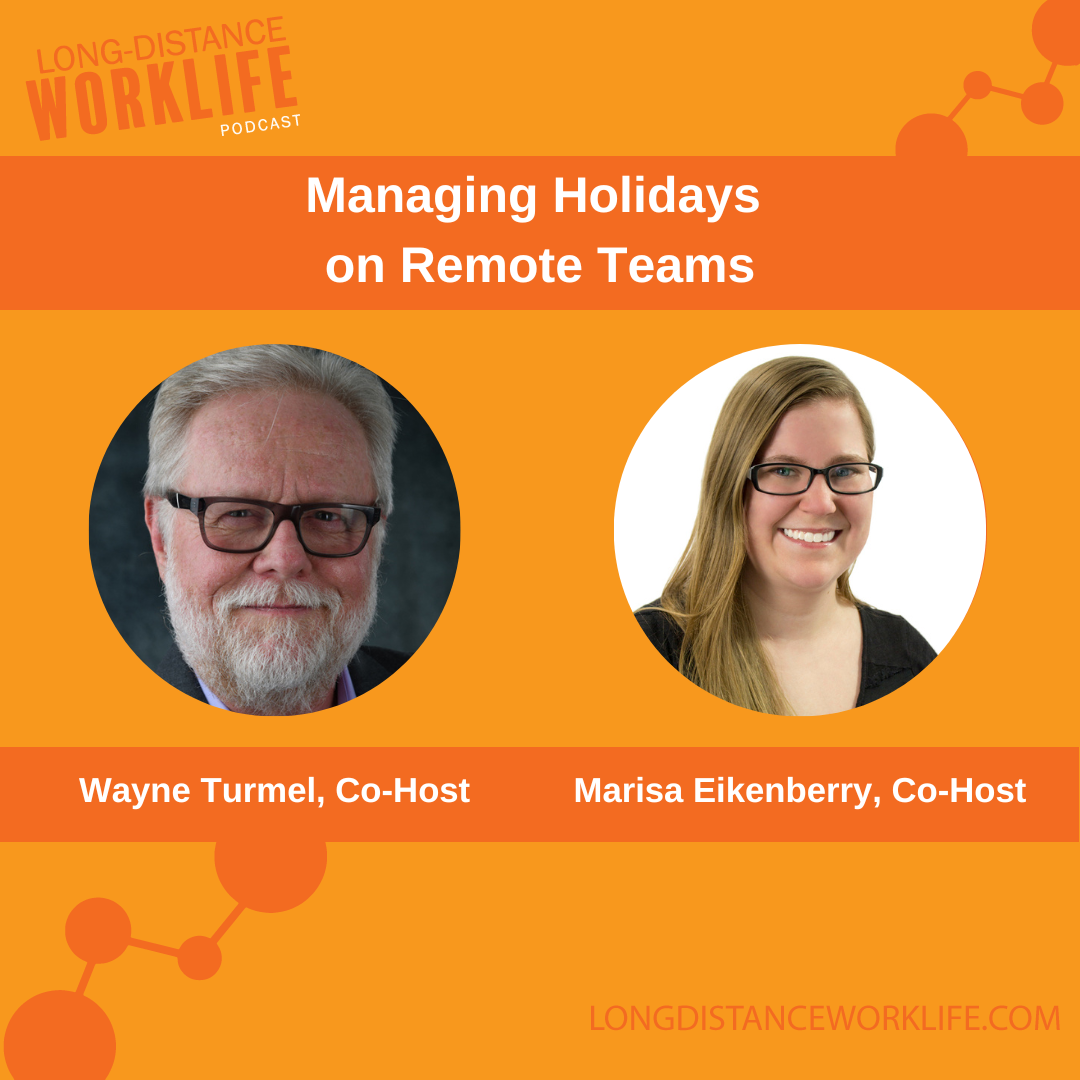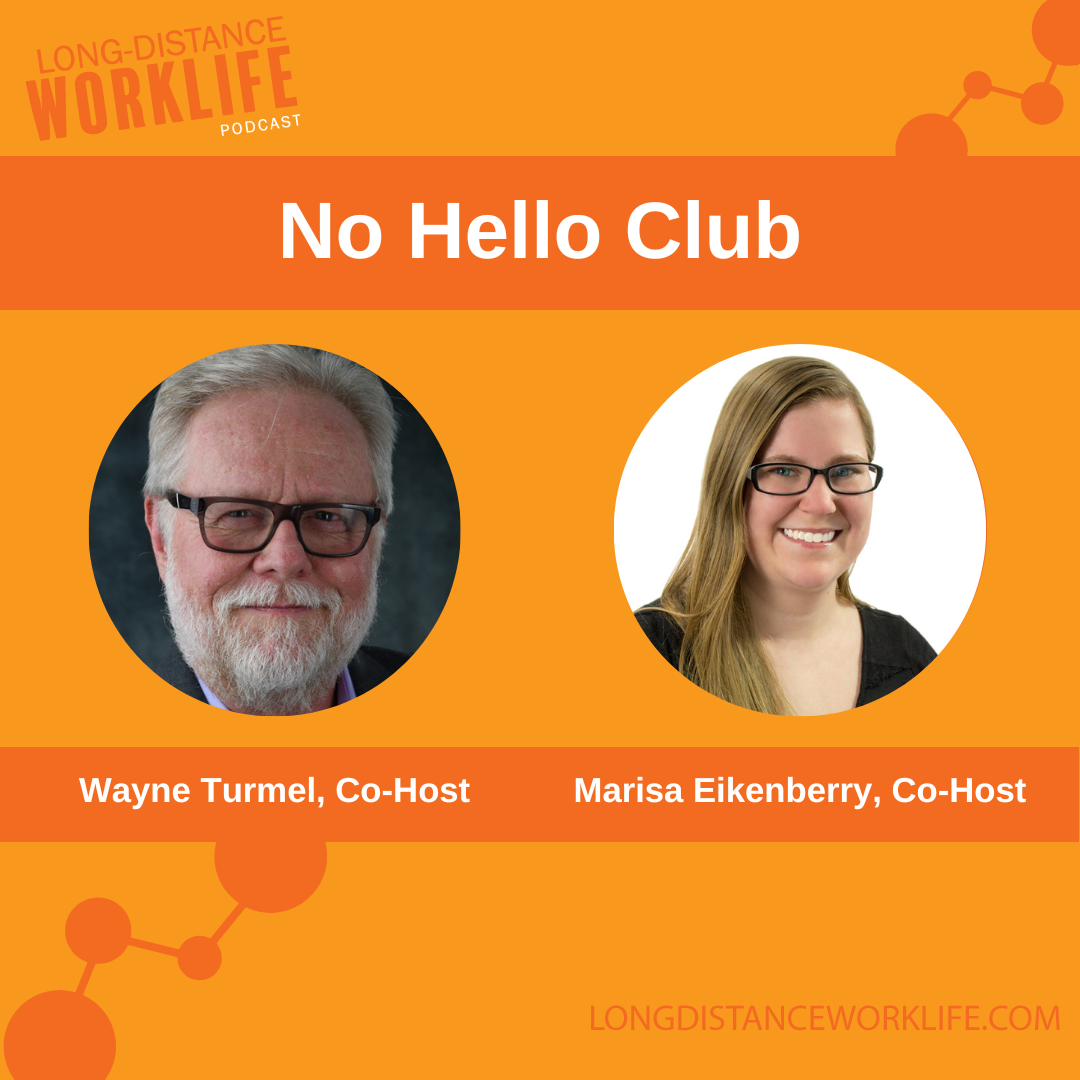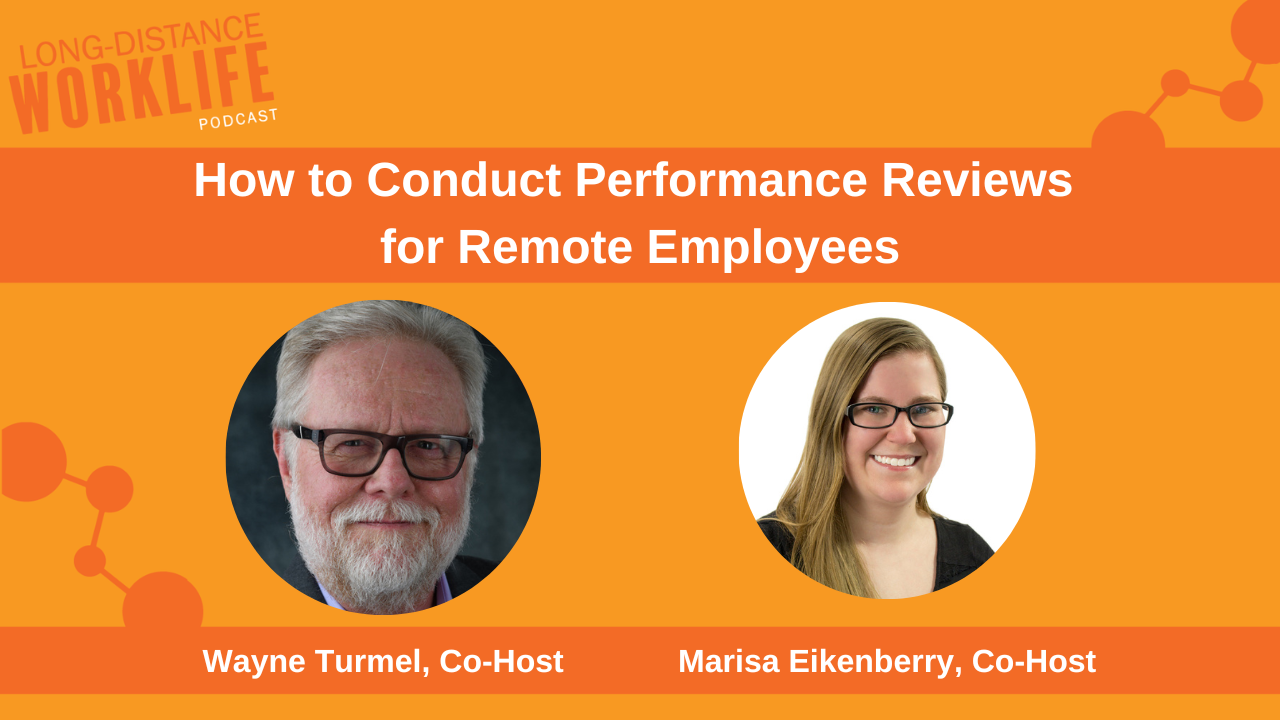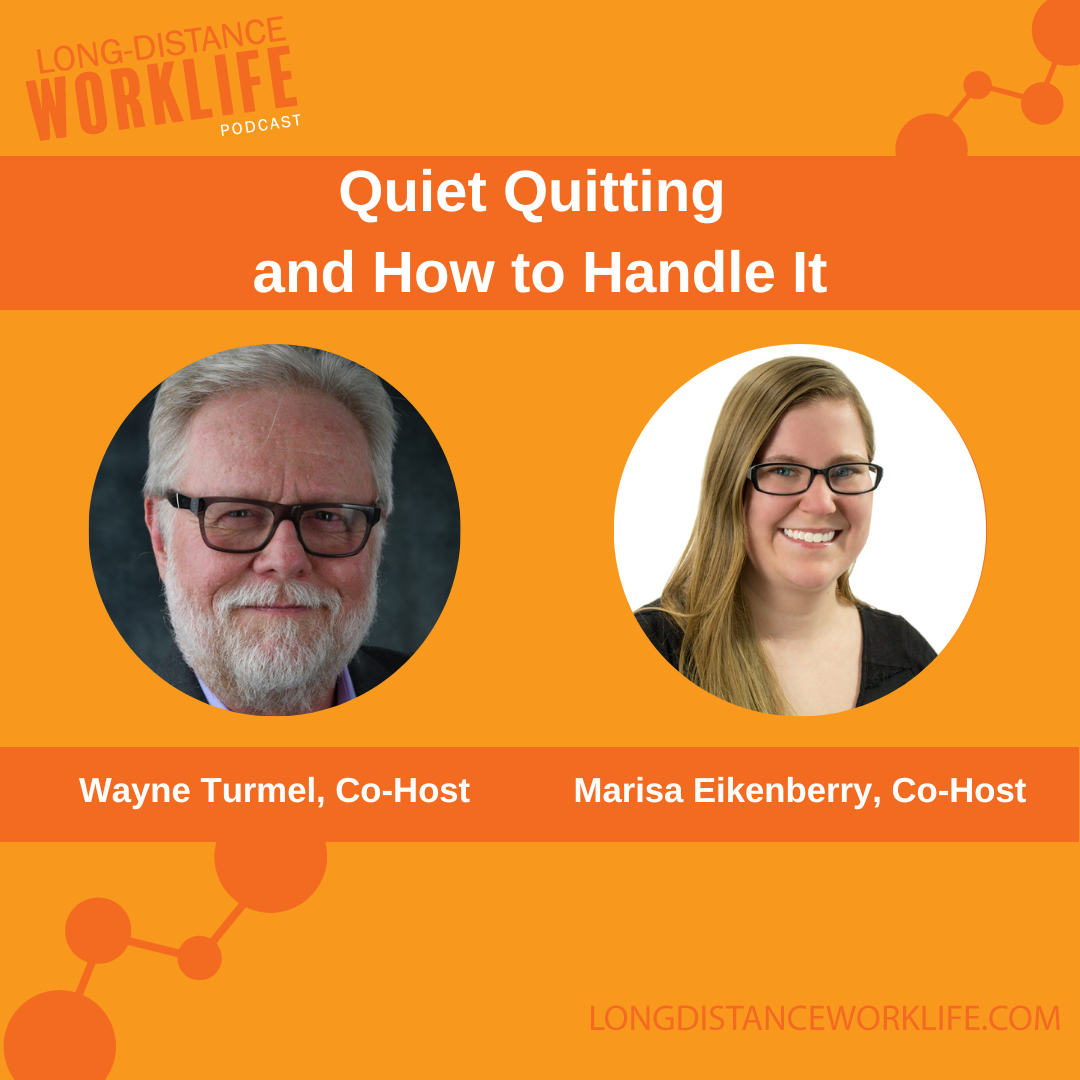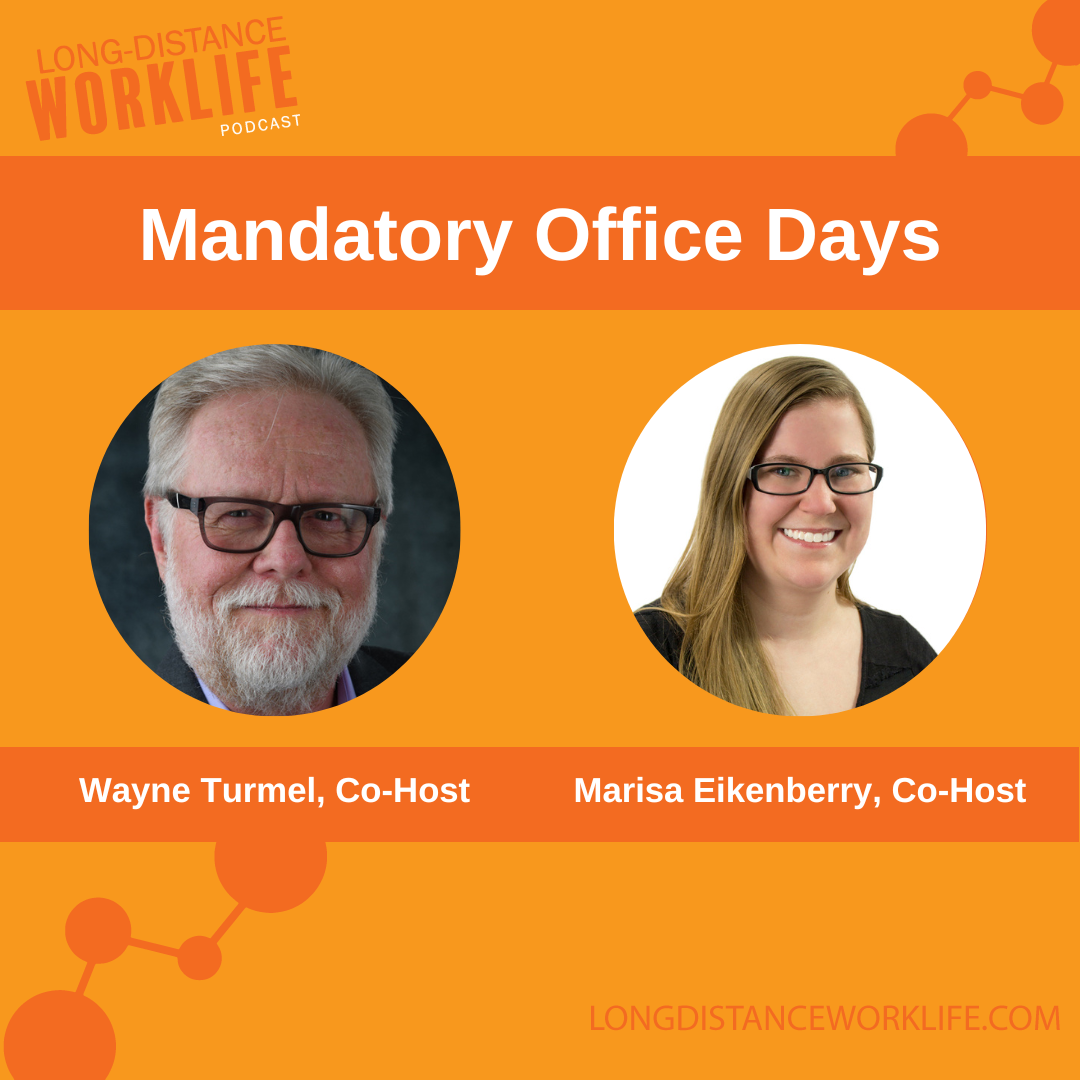00:00:09:06 - 00:00:21:18
Marisa
Welcome back to the Long-Distance Worklife where we help you lead, work and thrive in remote and hybrid teams. I'm Marisa Eikenberry, a fellow remote worker, and joining me is my co-host and remote work expert, Wayne Turmel. Say hi, Wayne.
00:00:23:02 - 00:00:27:05
Wayne
Hi. And yes, please call me an expert. And everybody immediately goes.
00:00:28:19 - 00:00:30:07
Marisa
Okay, well, compared to me.
00:00:30:20 - 00:00:32:13
Wayne
Well, if we but we we
00:00:32:13 - 00:00:33:03
Marisa
You wrote the book!
00:00:33:03 - 00:00:40:07
Wayne
We're having this discussion about the fact that the minute you call yourself a guru, you automatically put this giant target on your back.
00:00:41:11 - 00:01:10:06
Marisa
Guru ninja, that's a little different. Expert is a totally different ball game. But speaking of titles, I wanted to talk about head of remote. So you know, we see this under many names. You see head of remote, you see chief remote officer, director of remote. There's plenty more that I could go on and on with. But I wanted to boil it down to let's just start with what is a head of remote anyway?
00:01:10:11 - 00:01:20:15
Wayne
What is a head of remote? If you think about the unique challenges of remote work in an organization.
00:01:20:15 - 00:01:21:03
Marisa
Mm hmm.
00:01:21:03 - 00:01:22:12
Wayne
There are a lot of moving parts.
00:01:22:19 - 00:01:23:06
Marisa
Of course.
00:01:23:16 - 00:01:39:10
Wayne
There's as. How do we hire and find people? There's. What technology should we be using? There's what are the processes that we're going to institute? What infrastructure do we need to all those things. Right.
00:01:39:10 - 00:01:39:17
Marisa
Right.
00:01:40:05 - 00:01:48:03
Wayne
And they all belong to different pieces of it. A lot of organizations leave all the technology decisions to it.
00:01:48:17 - 00:01:52:02
Marisa
Mm hmm. Which may or may not be the greatest decision.
00:01:52:06 - 00:02:38:00
Wayne
I love to love and respect to the i.t people, but they should not be making all the decisions. Right? Right. I t doesn't really know and work every day with the same processes and tools that the sales team does, which is different than the accounting team, which is different than somebody else. And this is how organizations wind up with moderately okay tools because i.t is looking for one thing, one ring to rule them all so that they're not having to learn and support eight different tools and and they may or may not be doing the right thing for the various business units.
00:02:38:00 - 00:02:41:13
Wayne
That's just an example. Right. Not to pick on them.
00:02:41:13 - 00:02:43:23
Wayne
Yeah. Not a criticism. Goodness knows, I'm IT too.
00:02:45:07 - 00:02:52:11
Wayne
But the fact remains that in most organizations, nobody owns this stuff.
00:02:52:22 - 00:02:53:06
Marisa
Right.
00:02:53:17 - 00:03:16:22
Wayne
It's nobody's job. Right. And so you've got H.R. desperately trying to put policies in place and you've got managers who are just running their little fiefdoms. The way they're running their little fiefdoms. Right. I'm going. No, this is the tool you're going to use. And I'm probably going to say a lot of really bad things about Microsoft teams today.
00:03:17:14 - 00:03:18:03
Marisa
Okay.
00:03:19:02 - 00:03:24:22
Wayne
But it's because Microsoft Teams is the attempt to find one ring to rule them all.
00:03:25:09 - 00:03:25:21
Marisa
Gotcha.
00:03:26:10 - 00:03:28:14
Wayne
And it wasn't ready.
00:03:29:10 - 00:03:31:16
Marisa
Right. We've talked about this in the previous book.
00:03:31:16 - 00:03:41:00
Wayne
We're down. We'll go down that rabbit hole, I'm sure. The point is that the idea of a head of remote crow, whatever you want to call.
00:03:41:00 - 00:03:41:15
Marisa
It, right.
00:03:41:15 - 00:04:11:05
Wayne
Is a desperate attempt for somebody to take ownership of this particular challenge. And at the moment, you know, people stuck their fingers in the dam kind of as best they could when pandemic hit. And hey, I always said, you know, before the pandemic, I talked to so many organizations that, oh, yeah, we're putting our plan together, we're putting our strategy together.
00:04:11:09 - 00:04:15:01
Wayne
In the next six months, we're going to create a strategy.
00:04:15:09 - 00:04:15:18
Marisa
Yeah.
00:04:16:01 - 00:04:21:08
Wayne
And then they got thrown in the deep end and strategy was replaced by survival.
00:04:21:16 - 00:04:25:14
Marisa
Yeah. Six months became six days. What's the calories in something?
00:04:25:14 - 00:04:38:17
Wayne
Remember in January of 20? Talking to a client this big law firm that was very proud of the fact that by June, they were going to have, I think, 60% telework.
00:04:39:04 - 00:04:39:10
Marisa
Okay.
00:04:39:20 - 00:04:54:02
Wayne
As they called it at that time. And by March 17th, it was 100% right. Right. I mean, this pandemic is kind of the perfect example of if you want to hear God laugh, tell them your plans.
00:04:54:09 - 00:04:55:13
Marisa
Right. Absolutely.
00:04:56:14 - 00:05:15:21
Wayne
And so, you know, everybody was treading water and thinking about it and doing the best they could. And some organizations are very nimble and fast and figured it out. Of course, smaller organizations have an easier time making those decisions than larger organizations.
00:05:15:21 - 00:05:17:00
Marisa
Right. Less people to manage.
00:05:17:19 - 00:05:40:07
Wayne
Well, there's less people to manage. There's fewer moving parts. And it's fewer people with more responsibility. I mean, let's just take Kevin Eikenberry group. Yes. 13 people. Kevin's name is on the door. Ultimately, he makes the big, important decisions. Right. We advise and consent and do all that good.
00:05:40:12 - 00:05:41:06
Marisa
We do the research.
00:05:41:06 - 00:05:43:13
Wayne
At the end of the day. Kevin makes the call.
00:05:43:20 - 00:05:46:00
Marisa
Right.
00:05:46:02 - 00:05:58:01
Wayne
Well, you know, does the CEO of Chase Bank need to be down in the weeds about implementing hybrid work?
00:05:58:07 - 00:06:00:04
Marisa
Right. He's going to delegate that to somebody else.
00:06:00:10 - 00:06:05:20
Wayne
It needs to be. But now who gets it? Is it the head of major? Is it right?
00:06:06:05 - 00:06:07:11
Marisa
Hence, head of remote. Okay.
00:06:08:07 - 00:06:37:06
Wayne
And so it's just a way of making sure that somebody owns it, that somebody is connecting the human piece, the technology piece, the process piece, the paperwork piece. You know, there are things that most of us mere mortals never think about. If you've got people in different states, have you file taxes in those states, and what are the labor laws in one state that doesn't allow massive amounts of overtime in another?
00:06:37:13 - 00:06:56:14
Wayne
And, you know, there are so many moving parts as we move to hybrid work that somebody needs to own that. Now, you know. Head of remote. Chief Remote Officer I mean, any time you put a chief in front of anything.
00:06:57:14 - 00:06:59:01
Marisa
Yeah.
00:06:59:01 - 00:07:18:01
Wayne
Because some organizations have a vice president of h.r. Others have a chief human resources officer. What that does is it's kind of like in government, it's the president or the prime minister's cabinet. When you give somebody a C title, you are ensuring them a place at the table.
00:07:18:13 - 00:07:20:22
Marisa
Right. Yeah. They're part of the C-suite now.
00:07:21:01 - 00:07:27:17
Wayne
And somebody with that responsibility is communicating at the very highest levels.
00:07:28:08 - 00:07:29:09
Marisa
Right. That makes sense.
00:07:29:22 - 00:07:48:15
Wayne
So it's and it gets a little bit crazy. I am not a big believer in titles. You know, the example is always in the banking industry. You know, we'll give you in title a title in lieu of a raise. And so everybody in the bank is a vice president.
00:07:49:00 - 00:07:49:08
Marisa
Yeah.
00:07:50:19 - 00:07:59:17
Wayne
You know, and a lot of organizations, people make up their own titles. I mean, we were making fun of people who call them so well for a while.
00:07:59:19 - 00:08:01:11
Marisa
Yeah, I was a web guru.
00:08:01:22 - 00:08:06:23
Wayne
That was a web guru. That's what it said on your card. That's how we introduced you to everybody.
00:08:07:06 - 00:08:10:23
Marisa
That was the job title when I applied. So that's.
00:08:11:00 - 00:08:25:02
Wayne
What I said. I'm going, What? What are we looking for? Oh, we're looking for a web guru. Oh, look, there's your job title. That's right. You know, because titles don't mean anything to the rest of the world.
00:08:25:13 - 00:08:26:06
Marisa
Right. Kevin.
00:08:27:06 - 00:08:38:02
Wayne
Who is, you know, one of the world's leading experts on leadership and it's his company. So he would normally be the CEO or the president. He is the chief potential officer.
00:08:39:13 - 00:08:41:17
Marisa
Yup. Which is nothing to anyone else.
00:08:41:23 - 00:08:48:19
Wayne
I have busted his chops more than once. I mean, what does that even mean?
00:08:48:23 - 00:08:50:06
Marisa
And his response was.
00:08:51:06 - 00:09:14:10
Wayne
I don't know that he's ever really responded. I mean, I'm assuming that it's about bringing out the best in people. And, of course, that's what we do here. And, you know, Kevin is all sunshine and light as opposed to Mr. Cynical here. And it is something different than chief executive officer or president. I mean, first of all, it's the Kevin Eikenberry group.
00:09:14:10 - 00:09:19:06
Wayne
You don't need to be a business strategy genius to figure out that he's the boss.
00:09:19:23 - 00:09:20:11
Marisa
Right.
00:09:21:00 - 00:09:37:03
Wayne
So, you know, call it Fred for all it matters. It's it's the job. So I'm not a big fan of titles. Right. And we know this in our work with leaders, you can be a manager and not be a leader.
00:09:38:02 - 00:09:40:00
Marisa
And you can be a leader and not be a manager.
00:09:40:01 - 00:09:53:01
Wayne
Well, and we kind of differentiate that. And maybe folks have heard us talk about this before on the podcast. But there are large AL leaders and small leaders. And the large AL leaders are the ones with the job description.
00:09:53:22 - 00:09:54:15
Marisa
That we are.
00:09:54:15 - 00:10:03:21
Wayne
Leaders. We are senior leaders. We are managers. We are small l leaders are actually far more powerful. These are the people who exhibit leadership behavior.
00:10:04:13 - 00:10:06:07
Marisa
They have influence and potential.
00:10:06:12 - 00:10:23:22
Wayne
They have influence and they make an effort and they do what they can to make the organization and the people around them better. They exhibit leadership behaviors, but they don't have the nametag that says leader. I mean, not to embarrass you. You are a very good example of.
00:10:24:03 - 00:10:24:15
Marisa
Thank you.
00:10:24:15 - 00:10:42:09
Wayne
I mean, if you look at the org chart of Kevin Eikenberry group, you know. Oh, yeah. Or somewhere between plankton and kelp. Absolutely. Actual food chain. Um, if you look at your importance to the organization, how people respect you, how they work with you, you are far more important.
00:10:42:19 - 00:10:46:02
Marisa
Yeah, I lead projects. I don't necessarily lead people.
00:10:46:02 - 00:10:55:00
Wayne
I don't have you don't have anybody answering to you. Exactly right. But there is no doubt in anybody's mind in this organization that you are a leader.
00:10:56:07 - 00:10:58:22
Marisa
As could be said of many others of us do well.
00:10:59:12 - 00:11:07:16
Wayne
But we hire for that course trait. And, you know, we teach this stuff. It would be really awful if we had a bunch of sheep.
00:11:08:02 - 00:11:08:16
Marisa
Right here.
00:11:09:00 - 00:11:33:00
Wayne
In your organization. But to get back to the point of yes, sation, which is around title. So what does a chief remote officer ahead of remote? There are a couple of things at this stage of where organizations are. This is a combination of project management.
00:11:33:12 - 00:11:33:21
Marisa
Okay.
00:11:34:09 - 00:12:03:17
Wayne
Because organizations are putting i.t. Decisions in place. There's h.r. Is updating its policies on performance reviews and and how we onboard people and all the stuff that h.r. does. It is doing its thing. You know, we've got to put the financial processes in place to make sure people get paid and get their taxes taken out and, you know, their benefits apply and all that good stuff.
00:12:04:03 - 00:12:11:00
Wayne
So there's a lot of moving pieces. And so essentially a a good head of remote is the project manager.
00:12:11:02 - 00:12:12:14
Marisa
Okay. For not just.
00:12:13:19 - 00:12:26:03
Wayne
Now, who do they answer to this? Depends whether it is a big enough project, but it's a big enough project that in most organizations they need at least answer to a VP.
00:12:26:17 - 00:12:27:00
Marisa
Mm hmm.
00:12:27:18 - 00:12:35:04
Wayne
And in a medium sized or a small organization, they're going to want access to the C-suite.
00:12:35:13 - 00:12:36:19
Marisa
Absolutely. That makes sense.
00:12:37:03 - 00:12:44:11
Wayne
So it's partly project management and to be really effective. It's also change management.
00:12:44:22 - 00:12:45:07
Marisa
Okay.
00:12:45:11 - 00:12:52:23
Wayne
Which is a project management is a piece of that. Change management is largely a people skill.
00:12:53:10 - 00:12:58:02
Marisa
Yes. Yeah. Because you have to walk people through those changes and let's get real. Not everybody likes change.
00:12:58:09 - 00:13:40:14
Wayne
Not everybody likes change. You know, it's the whole move my cheese conversation. It's but so there is this very big leader, people, leadership, pieces, project leadership. And then there's the people leadership piece. So, you know, does your organization need a head of remote? Do they need somebody needs to own it? I think in a lot of organizations, probably the kinds of organizations, the size of organizations that the people listening to this podcast are in, it's probably a project manager piece.
00:13:41:07 - 00:13:42:08
Marisa
Okay. That makes sense.
00:13:42:08 - 00:13:45:21
Wayne
And the question then becomes, is this a temporary.
00:13:46:22 - 00:13:49:18
Marisa
Yes. I was going to ask you about that. Like, I know.
00:13:50:13 - 00:13:51:00
Wayne
I saw the.
00:13:51:04 - 00:13:55:01
Marisa
I know you're answering all my questions before I can ask them.
00:13:55:01 - 00:14:00:12
Wayne
We're trying to make this sound like it's an actual conversation.
00:14:00:22 - 00:14:03:20
Marisa
Yes. So is this a long term? Yeah, I.
00:14:03:20 - 00:14:07:14
Wayne
Think, again, it will depend on the organization.
00:14:08:00 - 00:14:08:12
Marisa
Makes sense.
00:14:09:01 - 00:14:29:13
Wayne
You know, because once the pieces are in place, once we have MHR policy and a hiring policy and onboarding policy and you know, we know are people supposed to come into the office X number of days or not and all that stuff gets figured out? It's pretty much just keeping the plates spinning.
00:14:30:15 - 00:14:31:06
Marisa
That makes sense.
00:14:32:01 - 00:14:40:16
Wayne
Now, that is presuming that we reach some kind of Stacey's right. Right.
00:14:40:16 - 00:14:42:11
Marisa
Some of us are still trying to find the station.
00:14:42:16 - 00:15:03:03
Wayne
That at some point we reached something that becomes the new normal, which people have even stopped saying even. Right. Like they're beyond hoping that there actually is a new normal. But at some point, the organization, each organization will reach a point where the music stops and everybody's found the chair.
00:15:03:09 - 00:15:05:07
Marisa
Right. Yeah. We're slowly getting there.
00:15:05:23 - 00:15:08:19
Wayne
And it's going to be longer than people think.
00:15:08:23 - 00:15:09:10
Marisa
Of course.
00:15:09:17 - 00:15:32:21
Wayne
But at some point, do you does your organization reach a point where, oh, okay, we know how this works. We know what our culture is. We know how we're going to work together. We know how all the different departments fit together. And we're maximizing our people and their ability to have flexible and hybrid work.
00:15:33:07 - 00:15:33:11
Marisa
Mm hmm.
00:15:34:07 - 00:15:46:17
Wayne
Then does the piece of that go back to H.R.? Right. Go back, you know. Or does that get rolled under something like chief operating officer?
00:15:47:04 - 00:15:48:11
Marisa
Right. Okay. That makes sense.
00:15:48:16 - 00:15:59:19
Wayne
Which is a role that already exists that is supposed to do the day to day operations of the organization. Well, realistically, I guess this stuff fits under there.
00:16:00:10 - 00:16:02:00
Marisa
Gotcha. I hadn't thought about it like that, but.
00:16:02:00 - 00:16:11:14
Wayne
The average Chibok chief, chief operating officer and Dr. Floyd to the front desk, please. The average chief operating officer.
00:16:11:14 - 00:16:11:21
Marisa
Right.
00:16:12:15 - 00:16:21:15
Wayne
Now has enough on their plate that they don't need to be focusing on this specific head of remote role.
00:16:21:23 - 00:16:22:10
Marisa
Gotcha.
00:16:22:10 - 00:16:26:22
Wayne
Right. That person probably logically answers to the CEO.
00:16:27:20 - 00:16:28:21
Marisa
That totally makes sense.
00:16:29:09 - 00:16:40:23
Wayne
So this is all part of a larger thing, which is we are and people are underestimating what a seismic change we've gone through.
00:16:41:21 - 00:16:42:06
Marisa
Yeah.
00:16:43:03 - 00:17:02:16
Wayne
The world has changed completely. It's never going back to what it was. And I know a lot of people want to. And, you know, Boris Johnson can say everybody needs to come back to the city of London and the mayor of Seattle can say, for the love of God, everybody come back to Seattle and, you know.
00:17:02:20 - 00:17:03:19
Marisa
It's just not happening.
00:17:04:01 - 00:17:27:17
Wayne
Jamie Dimon can say, if you come into the office, you're great. And if you don't come into the office, you've basically derailed your career. And they can say that all they want. And in certain industries and certain organizations, that may be true. I think they are just a little late catching up to how seismic the change has been.
00:17:28:04 - 00:17:28:14
Marisa
Yes.
00:17:30:00 - 00:17:50:09
Wayne
But people need leadership to go through this kind of seismic change. They need leadership in terms of providing accountability. Right. Who's responsible for this? Right. They need leadership in terms of giving people confidence in the organization that somebody is actually looking at this stuff.
00:17:50:09 - 00:17:52:20
Marisa
Yeah. Somebody is advocating for the remote workers.
00:17:53:19 - 00:18:21:17
Wayne
And they need they need to feel confident that the information coming from that person is going to be accurate and transparent. For any of you who are listening to this going, oh, I should try to be you know, I should see if they'll make me chief remote officer, which by the way, I am all about people creating jobs.
00:18:21:21 - 00:18:30:12
Wayne
Oh, yeah. So if you're listening to this and you go, you know what, somebody needs to do this in our organization and I'm that person. God love you have at it.
00:18:31:01 - 00:18:33:06
Marisa
And if you do it successfully, tell us about it.
00:18:34:03 - 00:18:34:14
Wayne
Yes.
00:18:34:14 - 00:18:36:02
Marisa
We want this to be a great story.
00:18:37:12 - 00:19:04:09
Wayne
And one of the hardest parts about that job is going to be that there is so much uncertainty and ambiguity. Right. There is going to be a lot of we think this is what's going to happen. And then you get the big reality pie in the face or the technology Warren supported or whatever. And you have to come back to people and go, okay, it's not going to be exactly what we thought.
00:19:04:21 - 00:19:06:08
Marisa
Yes, you deserve the right to change your mind.
00:19:06:17 - 00:19:33:14
Wayne
If you are not careful, it's very easy to look like you were lying. Yeah, like you were blowing smoke up people's skirt. They. You were, you know, trying to not give them the reality of the situation. The reality of the situation is sometimes circumstances change and how you communicate that. And this is a whole other topic for a whole other show is communicating change and doing all that good stuff, of course.
00:19:34:03 - 00:19:53:14
Wayne
But, you know, that's going to be the hardest. But yes, you need the project management graphing org chart skills to do the job as a project manager. But the biggest piece is going to be dealing with the ambiguity in a way that still builds trust and by it.
00:19:54:15 - 00:20:15:18
Marisa
Okay. That makes sense. So if we've established that some organizations or maybe many that don't necessarily think that they need one, you know, would benefit from hiring a head of remote. How does somebody go about hiring that position anyway? It's not like we've had this position around for a long time. How?
00:20:15:18 - 00:20:18:06
Wayne
I am not an expert on recruiting.
00:20:19:02 - 00:20:19:13
Marisa
Okay.
00:20:19:18 - 00:20:20:15
Wayne
I really.
00:20:20:19 - 00:20:21:02
Marisa
Yeah.
00:20:21:09 - 00:20:38:18
Wayne
But it seems to me that it's going to be, you know, you want to cast a wide net. You may or may not want to offer that position internally first. But it's described the job is part project management. It's part change management.
00:20:38:23 - 00:20:39:05
Marisa
Mm hmm.
00:20:40:08 - 00:20:55:09
Wayne
You know, you're going to be dealing with this area of the food chain. We may or may not want you in the office. Ironically fair because of access to the people that you're going to be working with.
00:20:56:00 - 00:20:59:16
Marisa
Well, I'm sure there'll probably be a technology piece along with that to bring you.
00:20:59:16 - 00:21:00:00
Wayne
Know.
00:21:00:05 - 00:21:02:01
Marisa
Bring some knowledge of some technology.
00:21:02:12 - 00:21:19:23
Wayne
Yes. You lay out the job description and you don't get must have a master's degree course. It's about hiring for the competencies and the skills is not for the degree because there is no degree in chief. Remote Officer.
00:21:20:13 - 00:21:20:22
Marisa
Yes.
00:21:21:10 - 00:21:37:04
Wayne
We are actually working with an MBA program at Mount Mercy University who is now at it now. So, you know, 2022 adding a remote piece in there. Mm hmm. In their MBA.
00:21:37:23 - 00:21:38:21
Marisa
That's fantastic.
00:21:38:23 - 00:21:46:21
Wayne
But nobody has this figured out yet. So quit worrying about degrees and focus on skills and vision.
00:21:47:22 - 00:21:50:17
Marisa
That totally makes sense.
00:21:50:21 - 00:22:27:00
Wayne
And so there you go. That is all the discussion. I love Marisa episodes. Marisa episodes are where she comes to me and goes, So I've got these questions and I go, Right, and there we go. But that being said, a couple of things. First of all, the book Long Distance Leader and Long Distance Teammate and relative to the CHR discussion, the upcoming Long-Distance Team is certainly something that you should look into if you haven't read those books yet.
00:22:27:22 - 00:22:54:21
Wayne
Also, if you are looking to develop the leadership skills necessary to lead long distance teams and projects, we would like to recommend shamelessly our Remote Leadership Certificate Series. And if you come to KevinEikenberry.com or remoteleadershipinstitute.com or even longdistanceworklife.com. We will have a link to that class. It's a six session, 2 hours a session.
00:22:54:21 - 00:23:33:11
Wayne
Virtual Training Program Introduction to Long Distance Leadership. We would love for you to join us on that. And we have public programs coming up soon. Marisa, thank you so much. You know, you know the drill I love Marisa manages our our page longdistanceworklife.com. Please like and subscribe. Leave comments reviews your questions. By the way, there's a spot on our website where you can submit your questions, which then become Marisa's questions.
00:23:35:00 - 00:23:39:12
Wayne
It's been a blast. Anything you want to say before we hit the road?
00:23:39:12 - 00:23:50:11
Marisa
The only thing I would also add is that our LinkedIn and email addresses are also in the show notes and feel free if you want to. You can also send us questions that way and we'll tackle them in a future episode.
00:23:51:06 - 00:24:13:09
Wayne
So that's it. Keep the weasels at bay. Have a wonderful day. We will see you or you will see us on the next episode.

